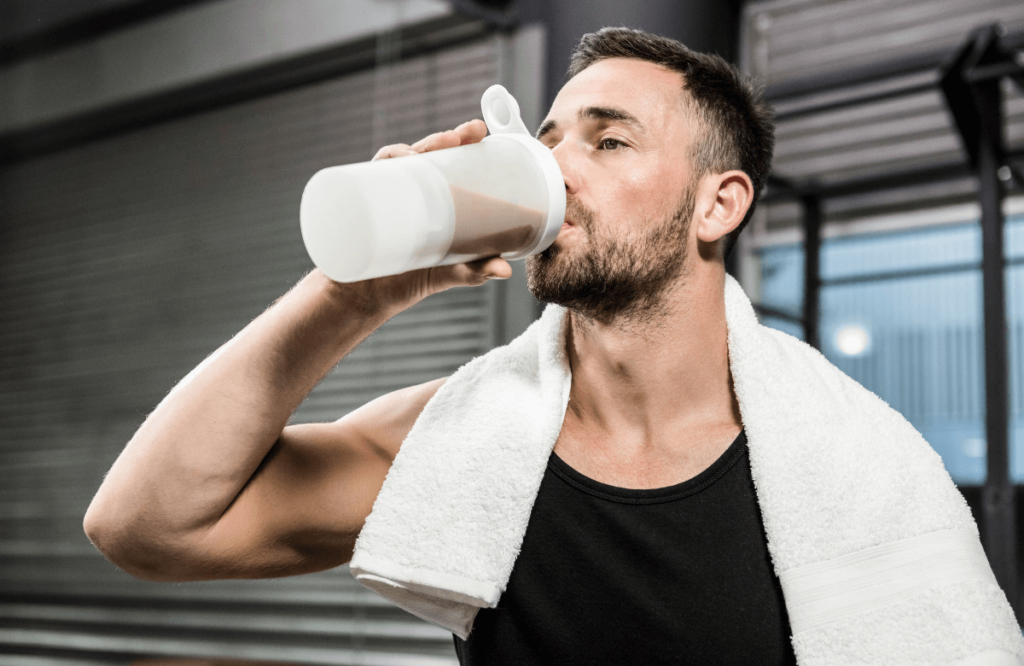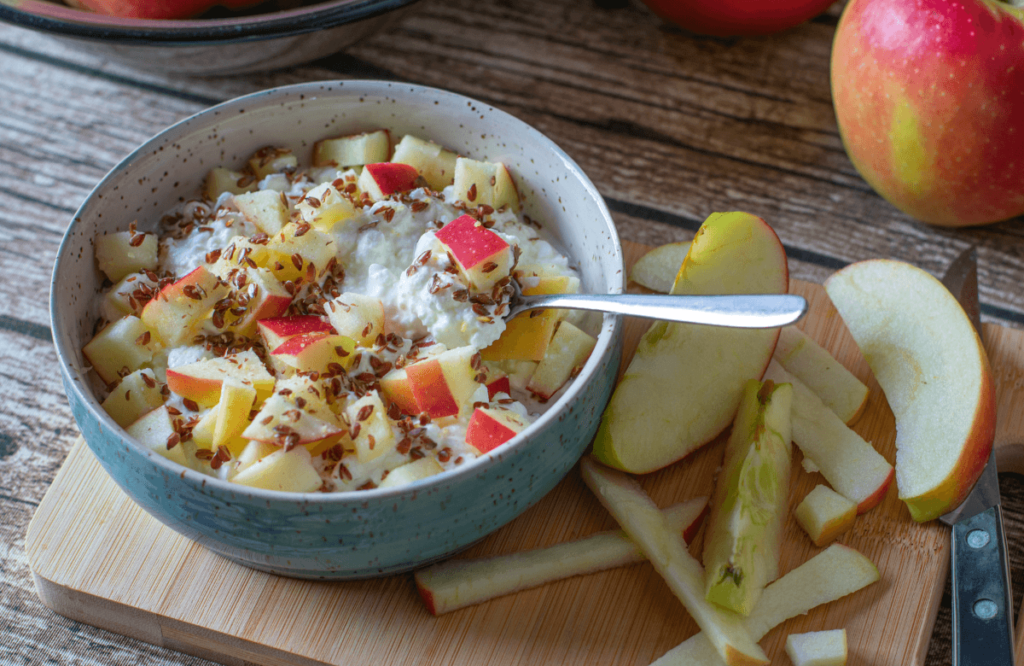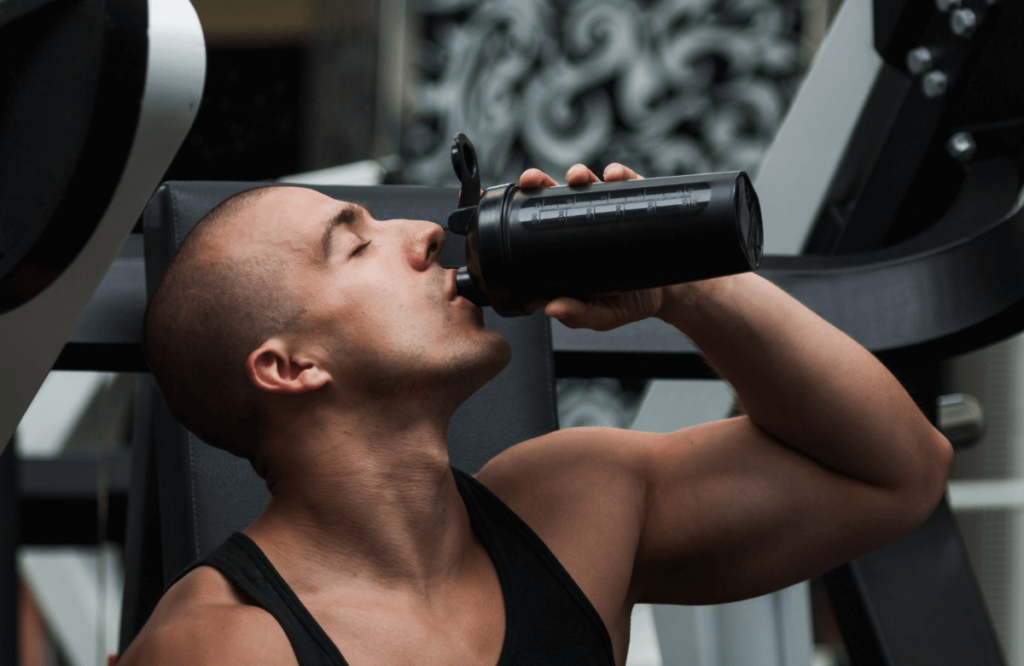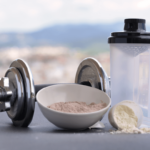If you haven’t caught on to current weight fitness trends, protein is all the rage. It’s great for curbing cravings, building muscle, and keeping you satisfied at meal times.
But like all foods, too much of a good thing can be a bad thing. And too little protein can inhibit your goal progress. It’s important to know how much protein for weight loss is required per day to meet your objectives.
Jump to:
Why Do You Need Protein for Weight Loss?
Your body is made up of protein amino acid chains that make your organs, skin, muscles, tendons, enzymes, hormones, neurotransmitters, etc. Your body makes a lot of these amino acids, but some you must get through your everyday diet.
You get protein through animal sources (meat, eggs, and dairy) or vegan sources like beans, nuts, and legumes. When you consume enough protein, it keeps your muscles, organs, skin, etc. healthy and aids in repair.
But protein can also help you lose weight by increasing your metabolic rate and helping to reduce cravings. Protein makes you feel full for longer when compared with carbs you burn through quickly and then want more.
If you’re eating enough quality protein spaced throughout your day, it’s easier to stick with your calorie-deficit diet because it decreases your appetite.
Also, some research indicates that eating more protein than carbs encourages your body to burn fat stores instead of the carbs you eat. As the metabolism burns through fat, you lose weight.

How Much Protein for Weight Loss? Should You Eat Daily?
So, what’s your number for protein intake? Let’s consider the factors.
Calculate Your Protein Needs
You can find online protein calculators to help you determine the amount of protein you should consume daily to aid in weight loss. This number will likely be higher for those with a weight loss goal than for those who are trying to maintain weight.
Typically, you’ll need between 0.7 and 1 gram of protein per pound you weigh. So a man weighing 200 lbs will need between 140 and 200 lbs of protein daily.
This number will differ based on your age, height, lifestyle, and gender. If you’re trying to maintain weight, your protein intake will equal about 0.36 to 0.5 grams of protein for every pound you weigh.
Do Active Adults or Athletes Need More Protein?
Yes. Those who work out often and intensely need more protein to keep their muscles strong and aid in repair. It’s recommended that very active adults eat between 1.2 and 2.0 grams of protein per kilogram of body weight.
Can Eating More Protein Help You Lose Weight Faster?
Typically, those who eat more protein lose weight faster. High protein, low carb diets are great for managing cravings and reducing your calorie intake. Reducing your carb intake also decreases the number of carbs your metabolism has to burn, making more room for fat burning. You also feel fuller longer and are less likely to indulge in high-carb foods that cause weight gain.
Examples of Protein in a Daily Diet
The best example of protein in a daily diet includes meat, fish, poultry, and eggs. Each of these is rich in amino acids, so you can quickly meet your protein goals by consuming these foods.
Other good sources of protein include beans, soy, nuts, nut butters, quinoa, wheat germ, and a few other grains. While these have lower protein content, they’re still a good way to increase your protein intake during the day.
Dairy is another great way to increase protein. If you’re trying to watch your calories, you can always stick with lower-fat versions of milk, Greek yogurt, and cheese.

5 Benefits of Focusing on Protein to Boost Weight Loss
There are many benefits of using protein to boost your weight loss goals. Let’s look at a few of the most compelling.
1. Reduce Cravings
One of our favorite weight-loss benefits of consuming protein is that it helps to reduce cravings for foods that tend to increase weight. Because it helps you to feel fuller for longer, you’re less likely to indulge in sweets, carbs, and junk food.
It takes longer to digest protein than carbs, which contributes to that extended full feeling. It can also increase the gut hormone peptide PYY that signals to the brain that your body is full.
So if you’re the kind of person who is constantly challenged by cravings, increasing your daily protein intake can make all the difference.
2. Build and Maintain Lean Muscle
Even without hitting the weights hard, you can build muscle just by increasing your daily protein intake. The more protein you eat, the more amino acids you absorb into your muscle tissue, which helps to repair and maintain the muscle you have.
If you’d like to increase your fat loss even more, add strength training to your workout regimen. Building up your muscles in this way alongside a diet rich in protein amino acids will boost your resting metabolism, helping you burn more calories at rest.
3. Boost Metabolism
As you focus on strength and weight training to help repair and grow your muscles, your metabolism both resting and at work will naturally increase. This is one reason that many people recommend going for a high-protein diet to achieve your goal weight.
To achieve a healthy weight, you want to target visceral fat, which is the fat around your organs. Boosting your metabolism will help target those stubborn underlying fat stores. As you shed subcutaneous fat (the fat right under your skin) you’ll also burn the fat beneath. Essentially, your increased metabolism will tackle the fat you want to disappear, improving your overall look.

4. More Efficiently Process Foods
Protein has a higher thermic effect than other foods, which means it helps the body burn energy at a higher rate. In fact, eating more protein can boost your metabolism enough to burn an extra 80-100 calories per day.
So simply digesting protein can help to increase your metabolism. About 30% of protein has a thermic effect, so for every 100 calories of protein you consume, it’s almost like you’re only eating 70 calories. This gives you a few more calories to spare while increasing the rate at which you burn calories.
5. Extend the Time Between Meals
Because it helps to decrease your appetite and cut cravings, you can naturally extend the time between each meal. As a result, you’re more likely to naturally cut calories without setting a restrictive diet.
Constant snacking is a leading cause of weight gain. You’re more likely to snack if you don’t feel full after a meal. So eating plenty of protein at meal times can help you get to your next healthy meal without excessive snack breaks.
Essentially, protein-rich foods can help you reach a healthy weight. This adds to the advantage of boosting your metabolism and helping you cut calories. Whether you’re tracking calories from meal to meal or increasing the amount of protein you eat throughout the day, your reduced appetite and cravings could help you lose weight.
Best Sources of Protein in Your Diet
Let’s examine what good dietary protein looks like. Most importantly, you should understand that whole food sources of protein are superior to supplements. Whenever possible, reach for a natural protein food source instead of a protein shake.
That being said, there’s a time and a place for protein supplements, and they can be a good way to reach your weight loss goals. They can also help build muscle mass if that’s the route you wish to take.

Whole Foods Rich in Protein
The metabolic benefits of whole food sources of protein are far superior to supplements. The thermic effect of protein you get from food is the highest of any food, so you can burn more fat with a protein-rich diet.
What are the best sources of whole protein? Your primary sources are animal products and plant foods. Here are some examples.
Meat
Chicken breast – 24 grams per 3oz serving
Turkey breast – 26 grams per 3oz serving
Pork – 23 grams per 3oz serving
Lean beef – 22 grams per 3oz serving
Egg – 6 grams for 1 large
Salmon – 19 grams per 3oz serving
Tuna – 31 grams per 6.5oz can
Tilapia – 21 grams per 3oz serving
Shrimp – 20 grams per 30z serving
Wild game – 27 grams per 3oz
Lamb – 21 grams per 3oz
Dairy
Cow milk – 8 grams per 1 cup serving
Cheese – 7 grams per 1oz
Cottage Cheese – 12 grams per 1/2 cup serving
Greek yogurt – 20 grams per 7oz serving
Low-fat yogurt – 7 grams per 1/2 cup
Kefir – 10 grams per 1 cup serving
Quark – 13 grams per 1/2 cup serving
Plant-Based Protein
Chickpeas – 39 grams per 1 cup
Mixed nuts – 27 grams per 1 cup
Chia seeds – 12 grams per 3oz
Tofu – 8 grams per 3oz serving
Tempeh – 16 grams per 3oz serving
Beans, legumes, and seeds – appx. 8-12 grams per 1/2 cup serving
Peanut butter – 8 grams per 2TBS serving
Quinoa – 8 grams per 1 cup
With these rich protein sources in mind, it should be no problem to incorporate more protein into your diet along with other essential nutrients. Ideally, you’ll consume small meals with protein as the main element. Doing so will curb hunger and give your body enough fuel to maintain energy while burning fat.
If possible, try to consume protein food every three hours. Consider three portion-controlled meals per day with protein at the center of the meal. But keep protein-rich snacks on hand to maintain the benefits of whole-food protein and to keep hunger at bay.
Easy snack ideas include mixed nuts, Greek yogurt, beef jerky, cheese sticks, cottage cheese with fruit or yogurt, hard-boiled eggs, or apples with peanut butter.

Supplements As Appropriate
While you get more out of protein-rich foods, supplements have their place. For many people, it’s much easier to grab a protein shake or bar than it is to prepare a plate of chicken breast or egg whites. You can consume more protein on the go, which still has a positive effect on weight loss and muscle mass.
Most experts agree that whey protein is the highest quality protein supplement. It has a high biological value and excellent thermic efficiency in the body.
Your body also digests liquid whey protein faster than whole food sources. While this doesn’t prove that your body digests it more efficiently, it does mean your body will absorb it well post-workout. If you’re after muscle growth, it’s a good way to get a quick hit of protein immediately following a training session.
Whole food protein sources have more benefits for your body, including additional nutrients, better absorption, and a boosted metabolism. Eating frequent meals with protein at the center is undeniably ideal for meeting your health goal.
However, whey protein supplements can offer many similar benefits with the biggest being convenience. You might not be able to grill a chicken breast after your workout to get that protein hit, but you can grab a protein shake and let the protein synthesis process begin. Likewise, it’s not always easy to eat small, protein-rich meals throughout the day, but almost everyone can fit in a protein bar or shake without interrupting their day.
The biggest disadvantage to protein powders and supplements is marketing duplicity. Don’t be fooled by whey protein powders that claim to have a significantly higher biological value than others. Marketing ploys would have you believe that your athletic performance depends on protein supplements, which isn’t true.
Protein supplements have their place, but remember that you can lose weight and build muscle without them.

Can Anyone Use a High-Protein Diet for Weight Loss?
Many people can enjoy the benefits of a high-protein diet for weight loss. However, experts agree that a high-protein diet should be a short-term solution.
About 10-35 percent of a normal diet should be calories from protein, and a high-protein diet could be as much as 50 percent. When your body is in a caloric deficit, and you’re getting half of your calories from protein, you risk missing out on essential vitamins and nutrients found elsewhere. Too much protein can also cause digestive discomfort.
Those with certain health problems should also avoid high-protein diets. Specifically, those with decreased kidney function should not do a high protein diet, as it can accelerate kidney dysfunction.
Regardless of your health status, it’s always a good idea to speak with your doctor about a high-protein diet. A healthcare professional can assess your health and inform you of the pros and cons before you proceed. They can also help you develop a safe and effective diet for weight loss.
Ultimately, if you’re cleared by your doctor to do so, starting a high-protein diet can help you achieve your weight goals. We suggest doing as much research as you can before getting started to help you get the right nutrients and stick with your plan.















